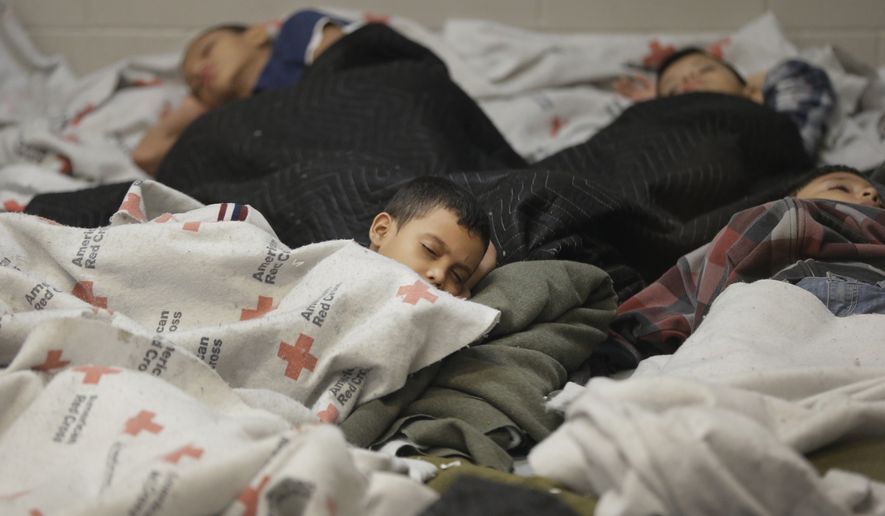The Obama administration released thousands of illegal immigrant children to sponsors with criminal records, including arrests on charges of child molestation, human trafficking and homicide, a top senator charged Tuesday.
If true, it would be a stunning black mark on President Obama’s immigration record, according to analysts, who said the first job of the government was to protect the children from dangerous situations — and it apparently failed.
At least 3,400 children were placed in homes where sponsors had criminal records, said Sen. Chuck Grassley, chairman of the Judiciary Committee, citing information from a whistleblower.
“Allegedly, proper screening is not taking place and children are paying the price,” the Iowa Republican said in a letter demanding answers about the procedural breakdown from Homeland Security Secretary Jeh Johnson and Health and Human Services Secretary Sylvia Mathews Burwell.
HHS didn’t deny the numbers but said it does try to prohibit those with “serious” criminal records from sponsoring children and does conduct some level of background checks on all sponsors.
The accusations were made just as the Border Patrol confirmed another surge of illegal immigrant children along the southwestern border, with nearly 5,000 unaccompanied minors and 6,000 more women and children traveling together streaming across in October.
SEE ALSO: Illegal immigrant children, non-Mexicans surge across U.S. Southwest border at record rate
Those are huge increases over last October, when 2,500 unaccompanied children and fewer than 2,200 family members traveling together were caught at the border.
Customs and Border Protection officials said they were “closely monitoring this situation” and blamed smugglers for enticing would-be migrants to make the perilous journey by promising they can earn “permisos,” or free passes, once they reach the U.S. The permisos are the court appearance documents that the Border Patrol issues before releasing them into the interior of the U.S., where they can easily disappear.
In the case of unaccompanied children, the Border Patrol turns them over to the Office of Refugee Resettlement, which is part of HHS. That office then houses the children in dormitories until sponsors can be found for them.
But the pressure to handle tens of thousands of children at a time overwhelmed the office last year. As a result, the office handed over children to sponsors who were not properly vetted, according to Mr. Grassley and other analysts.
“They were so overwhelmed with cases they were more interested in processing them quickly than in making sure it was done safely,” said Jessica Vaughan, policy studies director at the Center for Immigration Studies. “They seemed to be operating under this delusion these were harmless kids being reclaimed by well-meaning relatives and there was nothing to worry about. And that is truly delusional.”
She said conducting background checks has become routine even for youth sports coaches and library volunteers and it’s stunning that the Obama administration doesn’t require that for someone who is taking full custody of a child.
HHS spokeswoman Andrea Helling said the department does try to vet the people it allows to sponsor children.
“It is not the practice of the Office of Refugee Resettlement to place unaccompanied children with sponsors who have serious criminal convictions. The safety of the children is our primary concern, and any allegation of even potential harm is taken seriously and will be investigated,” she said.
Under the Obama administration’s interpretation of the law, children caught crossing the border illegally without parents are deemed “unaccompanied alien children,” or UACs. They are supposed to be processed quickly by the Border Patrol and then turned over to HHS, which puts them in juvenile homes until they can be reconnected with relatives or placed in foster families.
That often meant placing them with relatives who themselves were in the U.S. illegally.
HHS, faced with nearly 10,000 children a month at the peak last summer, cut corners, including no longer requiring that all sponsors go through fingerprint checks. Fingerprints are required if a sponsor is not a parent or legal guardian, and in cases in which a child is considered particularly vulnerable.
HHS does conduct a background check that includes running a sponsor’s name through criminal databases, and they listen to see whether a sponsor “self-reports” a criminal history during the vetting process.
As of August, HHS also now conducts follow-up visits 30 days after a child is released to a sponsor. In May, HHS began accepting calls to its hotline for children or their sponsors to report on disruptions, including conflicts that could endanger the safety of a child.
Immigrant rights advocates involved in monitoring the children’s cases could not be reached for comment Tuesday.
But last year, at the height of the surge, one nonprofit estimated that as many as 10 percent of the children were sent to live in unacceptable or dangerous conditions.
Mr. Grassley said Tuesday that the whistleblower, whom he did not identify, raised his concerns with the Obama administration in August, yet the children identified as having been put in jeopardy have not been removed from those homes.
The whistleblower saw information on just a subset of 29,000 children, and 12 percent of them were placed in homes where sponsors had records. Extrapolating across the nearly 110,000 unaccompanied children caught at the border over the past two years, that could mean nearly 13,000 children may have been placed in dangerous situations.
• Stephen Dinan can be reached at sdinan@washingtontimes.com.




Please read our comment policy before commenting.